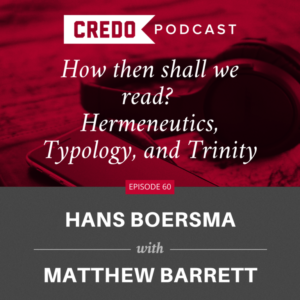
Podcast Throwback: How then shall we read? Hermeneutics, Typology, and Trinity
W hat kind of book is the Bible? If, as some suppose, the Bible is simply the product of human ingenuity, then we must read it like we read any other book. The meaning of any particular passage is limited strictly to the intention of the human author who wrote it. Questions pertaining to historical context, grammar, and human intent are the sum total of relevant hermeneutical questions. But if the Bible is another kind of book entirely, if it is authored not only by men but also by the Triune God who inspired them, then it is more than the sum of its parts. What is God up to with the words that he inspires? What kind of world does a duel-authored text like the Bible presuppose? What does metaphysics have to do with how we read the Bible?
hat kind of book is the Bible? If, as some suppose, the Bible is simply the product of human ingenuity, then we must read it like we read any other book. The meaning of any particular passage is limited strictly to the intention of the human author who wrote it. Questions pertaining to historical context, grammar, and human intent are the sum total of relevant hermeneutical questions. But if the Bible is another kind of book entirely, if it is authored not only by men but also by the Triune God who inspired them, then it is more than the sum of its parts. What is God up to with the words that he inspires? What kind of world does a duel-authored text like the Bible presuppose? What does metaphysics have to do with how we read the Bible?
In this episode of the Credo Podcast, Matthew Barrett is joined by Hans Boersma to discuss hermeneutics, typology, and the Trinity. In the end, they show how the Bible–and indeed, the world in which the Bible was written–is far more than meets the eye.


